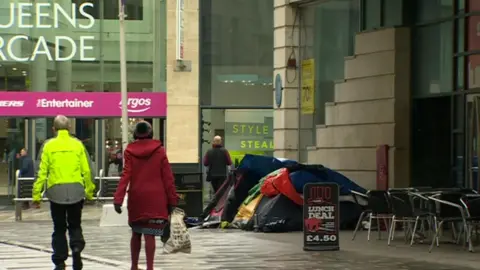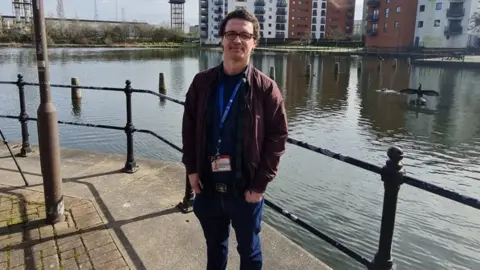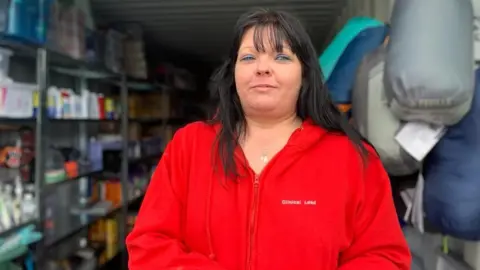Covid: Cardiff homeless numbers down 90% since pandemic
 BBC
BBCCalls to keep people off the streets post-lockdown have been made as figures show rough sleepers in Cardiff are down 90% from pre-pandemic times.
Cardiff council said numbers of people sleeping rough fell from about 80 in September 2019 to about eight.
Homeless charity Crisis wants law changes made to get people housed during the pandemic to continue.
Kirk Lovell, 38, who was sleeping in a tent in 2020 and now has a flat, said "brilliant" people helped him.
Crisis wants rules that can make it more difficult to get help to be permanently removed, including"barriers" such as regulations around local connections and priority need.
Chief executive Jon Sparkes said: "Homelessness is not just a disaster for individuals and families who face it - it also costs the public purse.
"If we don't change those barriers, we know people will continue to be turned away from local authorities when they need help."

Kirk's story
Kirk was sleeping in a tent in Cardiff when the first lockdown began in March 2020 - he moved into a hostel but thought he would not stay long as he had slept rough and in hostels for most of his life.
Last winter he would wake up to "snow and ice on my sleeping bag".
"I slept by John Lewis, waking up sick, now I don't have those worries. Everyone says I should be proud of myself but I constantly worry I might mess something up."
He started smoking cannabis in primary school and, as an adult, said he would take "anything and everything" and he "couldn't cope with life".
"It was a coping mechanism to help me hide and bury my head in the sand."
Now he has his own flat and has given up drugs.
Kirk grew up in care and "bounced around children's homes in England" before running away at 16.
He ended up sleeping rough in Devon.
About five years ago, he had surgery to remove an abscess on his brain and said his life "had to change drastically".
"Estranged family brought me back to Cardiff and tried to take care of me, but due to my lifestyle and addiction, I went back to the streets."
On telling the council he was homeless, he was advised he would have to wait three years for help, despite being born in the city.
So he slept in doorways, under bridges and in hostels until lockdown began and he was moved to the Youth Hostel Association (YHA) hostel.
"I was thinking I wasn't going to stay, that I'd do what they say and then I'm gone. But I was surprised, I had three meals a day and the staff were brilliant and treated us as equals."
Kirk stayed longer in the YHA than any other hostel he had lived in and got help to give up drugs, has started learning Spanish and begun work on his driving theory.
Being in his flat is "scary" as he said he was looked after at the YHA.
"If I had lived with my mum that's what I think it would have been like. But I'm learning. I used an oven for the first time and I can cook omelettes and make fried egg sandwiches.
"The next thing I want to make is spaghetti bolognese."
He has been in touch with his family and hopes to get a job and make his daughter proud.


Kirk was one of 187 rough sleepers Cardiff council has helped into accommodation since March 2020.
It said work with not-for-profit groups meant they could offer support for homeless people.
Gareth Edwards is in a team that helps homeless people become more independent and re-engage with society.
"We're able to intervene [immediately] and people are able to have a choice of support that's given to them," he said.
"Some feel they're ready to abstain from substances and there's a substance misuse worker and a counsellor to help them.
"If you've got mental health issues there's a community psychiatric nurse on hand. There's always someone there to help them."
Nurse Donna-Marie Thomas supports homeless people in south Wales through an organisation she founded, Homeless Hope.
Aged nine, she fled an abusive family and slept rough in London.
"People are still running away from abuse and they're still running away from bereavement," she said.
"I think a lot has been done in a lot of different places and I'd like to see the support continue to help people off the street."
Homeless Hope has not been providing care to people on the streets because of Covid-19 restrictions, but still gets calls for help.
"People who haven't got anywhere to go or someone's relative has passed away and now they're out on the street because the council want them out," Ms Thomas said.
"There are still gaps in what's being provided and there are still people out there."

The Welsh Liberal Democrats said: "We will change the way services and community partners work together so they can help people to cope long before they end up on the street.
"Where we can't prevent homelessness, we will ensure that people are supported into a suitable and secure home as soon as possible."
Plaid Cymru's housing spokeswoman, Delyth Jewell, said the party would enshrine "the right to housing" in law.
She added: "By the end of the first Senedd term, we will abolish the priority need system, deliver 50,000 social and affordable homes and ensure fair rents for the future."
The Welsh Conservatives said the party would "introduce a 'housing first' model for supporting homeless people, appoint a homelessness commissioner, ideally someone who has experienced homelessness, to work with stakeholders to tackle rough sleeping and its causes in Wales, and immediately bring 150 empty social housing properties back into use specifically for people who are at risk of homelessness."
Welsh Labour said the Welsh government had a "proud" record of tackling homelessness and had put more than 7,000 people into temporary accommodation since the start of of the pandemic.
A spokesman added: "We will build on the temporary measures we've put in place, grasping this unique opportunity to harness the creativity, innovation, collaboration and willingness to work differently to make a long term, sustainable and fundamental change to homelessness services in Wales."

- I WAS THERE WHEN S4C BEGAN: Mai Davies reunites those who remember the night S4C began
- 100 YEARS OF TOMMY COOPER: Mike Bubbins celebrates the life and work of the Welsh legend

